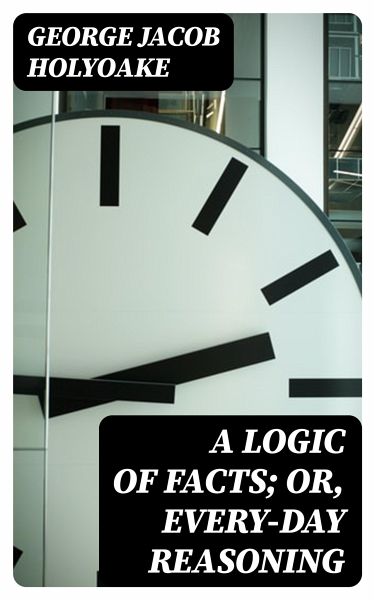
A Logic of Facts; Or, Every-day Reasoning (eBook, ePUB)
Enriched edition.
Kommentar: Carson, Everett / Redaktion: DigiCat
Sofort per Download lieferbar
0,49 €
inkl. MwSt.
Weitere Ausgaben:

PAYBACK Punkte
0 °P sammeln!
In "A Logic of Facts; Or, Every-day Reasoning," George Jacob Holyoake explores the foundational principles of reasoning as they apply to everyday life. This significant work, written in a clear and engaging style, emphasizes practical logic over abstract theory, providing readers with applicable skills for critical thinking. Holyoake's contribution to the field of logic arises within a broader context of 19th-century rationalism, as he deftly navigates philosophical discussions while making them accessible to the general populace. George Jacob Holyoake was an influential figure not only as a p...
In "A Logic of Facts; Or, Every-day Reasoning," George Jacob Holyoake explores the foundational principles of reasoning as they apply to everyday life. This significant work, written in a clear and engaging style, emphasizes practical logic over abstract theory, providing readers with applicable skills for critical thinking. Holyoake's contribution to the field of logic arises within a broader context of 19th-century rationalism, as he deftly navigates philosophical discussions while making them accessible to the general populace. George Jacob Holyoake was an influential figure not only as a philosopher but also as a social reformer and secularist. His experiences as a publisher and a proponent of cooperative movements shaped his understanding of public reasoning and the importance of rational discourse in personal and communal settings. Holyoake's work is reflective of his commitment to uplift society through education and enlightenment, solidifying his legacy as a pioneer in advocating logical reasoning in everyday affairs. Readers are highly encouraged to delve into Holyoake's "A Logic of Facts" to gain practical insights into reasoning that transcend academic confines. This work is not only a guiding resource for critical thought but also serves as a historical touchstone, appealing to both scholars and general readers interested in the development of logic and reasoning in the modern era. In this enriched edition, we have carefully created added value for your reading experience: - A succinct Introduction situates the work's timeless appeal and themes. - The Synopsis outlines the central plot, highlighting key developments without spoiling critical twists. - A detailed Historical Context immerses you in the era's events and influences that shaped the writing. - A thorough Analysis dissects symbols, motifs, and character arcs to unearth underlying meanings. - Reflection questions prompt you to engage personally with the work's messages, connecting them to modern life. - Hand-picked Memorable Quotes shine a spotlight on moments of literary brilliance. - Interactive footnotes clarify unusual references, historical allusions, and archaic phrases for an effortless, more informed read.
Dieser Download kann aus rechtlichen Gründen nur mit Rechnungsadresse in A, B, BG, CY, CZ, D, DK, EW, E, FIN, F, GR, H, IRL, I, LT, L, LR, M, NL, PL, P, R, S, SLO, SK ausgeliefert werden.













